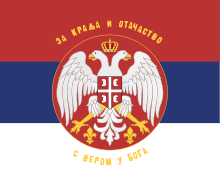Royal Serbian Army
| Royal Serbian Army | |
|---|---|
| Војска Краљевине Србије | |
 Regimental standard | |
| Active | 1882–1918 |
| Country | |
| Type | Army |
| Motto(s) | За веру, краља и отачаство Za veru, kralja i otačastvo "For Faith, King, and Fatherland"[1] |



The Army of the Kingdom of Serbia (Serbian Cyrillic: Војска Краљевине Србије, romanized: Vojska Kraljevine Srbije), known in English as the Royal Serbian Army, was the army of the Kingdom of Serbia that existed between 1882 and 1918, succeeding the Armed Forces of the Principality of Serbia and preceding the Royal Yugoslav Army.
Organization
Field armies
- First Army (Serbia)
- Second Army (Serbia)
- Third Army (Serbia)
- Timok Army
- Užice Army
Orders of battle
- Order of battle of the Serbian Army in the First Balkan War
- Order of battle of the Serbian Army in World War I
Wars
Military equipment
Armament
| Weapon | In use | Notes |
|---|---|---|
| Rifles | ||
| Mauser-Koka | 1881–1907+ | 110,000 units. Known as kokinka (pl. kokinke). Upgraded Mauser Model 1871. |
| Mauser-Koka 1884 | 1884–1918 | 4,000 units. Upgraded M71/84. |
| Mauser M1890 | 1912–1918 | |
| Mauser M1893 and Mauser Model 1903 | 1912–1918 | |
| Mauser M1899, M1899/07 and M1899/08 | 1899–1918 | |
| Mauser-Koka-Đurić | 1907–18 | Upgraded Mauser-Koka. |
| Mauser Model 1910 | 1910–1918 | |
| Berdan #1 and #2 | 1890–1918 | 75,000 units. Known as berdanka (pl. berdanci, berdanke). |
| Mauser Model 1889 | 1907–1918 | known as belgijanka (pl. belgijanke) |
| Berthier M1907/15 | 1915–18 | |
| Gras M1874 | 1880–1918 | |
| Lebel M1886 | 1916–1918 | |
| Mosin–Nagant M1891 | 1914–1918 | |
| Machine guns | ||
| Chauchat | 1916–1918 | 3,838 units. |
| Lewis | 1915–1918 | |
| Maxim | 1897–1918 | 2,500 units. |
| MG 08 | 1911–1918 | |
| Schwarzlose | 1914–1918 | [2] |
| Handguns | ||
| Chamelot-Delvigne M1873 and M1874 | 1887–1918 | |
| Gasser M1870 | 1883–1918 | |
| Nagant M1895 | 1896–1918 | |
| Ruby M1914 | 1916–1918 | |
| Grenades | ||
| Vasić M12 | 1904–1918 | |
Uniform
See also
References
- ^ MO SCG (2007). "Odbrana". Odbrana: Magazin Ministarstva Odbrane SCG. 3–4 (53–58). Novinsko-izdavački centar "Vojska": 71.
- ^ Willbanks, James H. (1 January 2004). Machine Guns: An Illustrated History of Their Impact. ABC-CLIO. p. 57. ISBN 978-1-85109-480-6.
Sources
Books
- W. H. Crawfurd Price (1918). Serbia's Part in the War ... Simpkin, Marshall, Hamilton, Kent & Company. (
 Public domain)
Public domain) - Milićević, Milić; Popović, Ljubodrag (2003). Генерали војске Кнежевине и Краљевине Србије. Vojnoizdavački zavod.
- Vasić, Pavle (1980). Uniforme srpske vojske: 1808-1918. Jugoslavija.
- Milkić, Miljan (2003). "Специфичности верског живота у војсци Кнежевине–Краљевине Србије". Војно дело.
Journals
- Mijalkovski, Milan. "Četničke (gerilske) jedinice Kraljevine Srbije–borci protiv terora turskog okupatora." Zbornik radova Instituta za savremenu istoriju 09 (2007): 59–81.
- Becić, Ivan M. "Ratni dugovi Kraljevine Srbije u svetlu politike." Istorija 20. veka 3 (2010): 45–56.
- Gavrilović, Dejan V. Fizičko vežbanje i vojska Kraljevine Srbije. Diss. Univerzitet u Beogradu-Fakultet sporta i fizičkog vaspitanja, 2016.
- Đorđević, Branislav D. "Training of the Serbian Army." Vojno delo 51.5-6 (1999): 149–165.
- Denda, Dalibor. "Српска војска у предвечерје епохе ратова 1912–1920." Zbornik radova Instituta za savremenu istoriju 12 (2014): 423–436.
- Đukić, Slobodan. "Contribution of the Military Academy to the development of military theory in Serbia in the second half of the 19th century and the first decade of the 20th century." Vojno delo 67.5 (2015): 401–425.
- Mladenović, Božica. "Vojska Kraljevine Srbije za vreme Balkanskih ratova u ogledalu nemačke štampe." Baština 22 (2007): 161–171.
- Barović, Vladimir. "Voluntary participation in the armed forces of the Kingdom of Serbia as a possible model of professionalization of the armed forces of the Republic of Serbia." Vojno delo 62.2 (2010): 348–360.
- Ivetić, Vladimir. Politička uloga ministara vojnih Kraljevine Srbije od 1903. do 1914. godine. Diss. University of Belgrade, Faculty of Political Sciences, 2013.
Symposia
- Ratković–Kostić, Slavica (2010). "Vojska Kraljevine Srbije 1916. i 1917. godine. Organizacija i formacija" [Armed forces of the Serbian Kingdom 1916 and 1917. Organization and formation]. Prvi svetski rat i Balkan–90 godina kasnije, Tematski zbornik radova. Institut za strategijska istraživanja [First World War and the Balkans–90 years after, Collections of papers, Strategic Research Institute]. Belgrade: 101–117.
